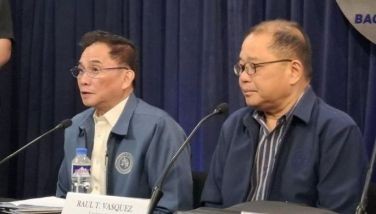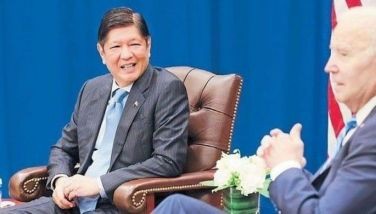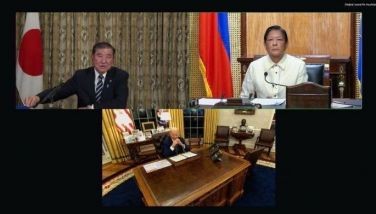Joker to House: Buckle down to work on impeachment
August 1, 2005 | 12:00am
Sen. Joker Arroyo called on opposition congressmen yesterday to firm up the impeachment case against President Arroyo and focus their efforts on gathering the remaining 37 signatures needed to automatically transmit the complaint to the Senate.
Arroyo said the President is relying on her allies at the House of Representatives as her "first and only line of defense." In contrast, in the impeachment case against former President Joseph Estrada, he had relied on his allies in the Senate.
"There lies the big difference. Thus, the gateway to heaven or to hell is in the House, not the Senate," Senator Arroyo said.
A major player in the impeachment case against Estrada, the former Makati City congressman said the majority will continue to belittle the opposition "till kingdom come" as long as the opposition does not have the required 79 votes.
"But with the 79, the opposition can no longer be ignored," Arroyo said."Since the opposition does not have the necessary one-third vote up to now, the majority keeps on brushing aside the opposition demands as if they are little children."
According to Sen. Arroyo, the opposition should "wake up, buckle down to work, shed off their indolence, stop talking and get the magic 79 endorsements."
And if the opposition succeeds in gathering all the 79 signatures, this can be made as a weapon against the majority "to open the gates," he said.
Arroyo recalled that he was among the opposition lawmakers who "assiduously" initiated the impeachment complaint against Estrada in 2000.
He said the opposition at that time gathered only 42 signatures or 17 percent of the House membership to support the Articles of Impeachment, and yet the complaint succeeded in reaching the Senate.
Administration lawmakers, on the other hand, warned the opposition against efforts to block the approval of impeachment rules.
Antique Rep. Exequiel Javier and Eastern Samar Rep. Marcelino Libanan pointed out that the opposition lawmakers themselves had helped craft the same impeachment rules in the previous Congress.
The same rules have been used to govern the impeachment proceedings against Supreme Court Chief Justice Hilario Davide and former Commission on Elections (Comelec) commissioner Luzviminda Tancangco, both lawmakers said.
Javier and Libanan noted the opposition’s strategy is to insist on new rules on the impeachment proceedings.
A new rule would in effect allow the strategy of railroading the impeachment complaint on a "creeping strategy" even if this is unconstitutional, they said.
Javier said the Supreme Court had already disallowed the practice in its ruling over the second Davide impeachment complaint.
He said the high court has already ruled a progression of signatures cannot be made anymore once the impeachment case is filed. The court also pointed out the initiation of the complaint starts from the time it was endorsed to the House justice committee, hence the one-year ban applies.
Javier explained that at the time the first impeachment complaint was filed by lawyer Oliver Lozano, only one member of the House endorsed it, short of the 78 required signatures or endorsements.
"This means the complaint cannot constitute an Article of Impeachment to divest the House of its jurisdiction through the justice committee to decide whether the complaint charges are an impeachable offense and whether there is substantial evidence to support it," he said.
Even if the opposition collects 79 signatures, they cannot divest the House of jurisdiction over the case since the required signatures were not obtained at the time of filing by Lozano, Javier said.
Javier cited Art. XI, Sec. 3 of the Constitution requiring that for an impeachment complaint to be turned into Articles of Impeachment and forthwith forwarded to the Senate for trial, one-third of all House members (or 79 votes) must sign or endorse the complaint at the time the case is filed.
He added though that the opposition is not barred from getting all the 79 signatures but this can be done during the plenary voting on the justice committee report endorsing the complaint.
This would mean that the report would be remanded back to the committee to fashion out the final impeachment finding that will be transmitted for action in the Senate, Javier stressed.
Libanan, vice chairman of the House committee on justice, for his part, blamed the opposition in delaying the approval of the impeachment rules.
"The rules are basically the same as those in the 12th Congress, and were used in the resolution of the impeachment complaints against Chief Justice Hilario Davide and former Commission on Elections commissioner Luzviminda Tancangco. Now they want to change the rules to suit their partisan political objectives," Libanan said. — With AFP
Arroyo said the President is relying on her allies at the House of Representatives as her "first and only line of defense." In contrast, in the impeachment case against former President Joseph Estrada, he had relied on his allies in the Senate.
"There lies the big difference. Thus, the gateway to heaven or to hell is in the House, not the Senate," Senator Arroyo said.
A major player in the impeachment case against Estrada, the former Makati City congressman said the majority will continue to belittle the opposition "till kingdom come" as long as the opposition does not have the required 79 votes.
"But with the 79, the opposition can no longer be ignored," Arroyo said."Since the opposition does not have the necessary one-third vote up to now, the majority keeps on brushing aside the opposition demands as if they are little children."
According to Sen. Arroyo, the opposition should "wake up, buckle down to work, shed off their indolence, stop talking and get the magic 79 endorsements."
And if the opposition succeeds in gathering all the 79 signatures, this can be made as a weapon against the majority "to open the gates," he said.
Arroyo recalled that he was among the opposition lawmakers who "assiduously" initiated the impeachment complaint against Estrada in 2000.
He said the opposition at that time gathered only 42 signatures or 17 percent of the House membership to support the Articles of Impeachment, and yet the complaint succeeded in reaching the Senate.
Administration lawmakers, on the other hand, warned the opposition against efforts to block the approval of impeachment rules.
Antique Rep. Exequiel Javier and Eastern Samar Rep. Marcelino Libanan pointed out that the opposition lawmakers themselves had helped craft the same impeachment rules in the previous Congress.
The same rules have been used to govern the impeachment proceedings against Supreme Court Chief Justice Hilario Davide and former Commission on Elections (Comelec) commissioner Luzviminda Tancangco, both lawmakers said.
Javier and Libanan noted the opposition’s strategy is to insist on new rules on the impeachment proceedings.
A new rule would in effect allow the strategy of railroading the impeachment complaint on a "creeping strategy" even if this is unconstitutional, they said.
Javier said the Supreme Court had already disallowed the practice in its ruling over the second Davide impeachment complaint.
He said the high court has already ruled a progression of signatures cannot be made anymore once the impeachment case is filed. The court also pointed out the initiation of the complaint starts from the time it was endorsed to the House justice committee, hence the one-year ban applies.
Javier explained that at the time the first impeachment complaint was filed by lawyer Oliver Lozano, only one member of the House endorsed it, short of the 78 required signatures or endorsements.
"This means the complaint cannot constitute an Article of Impeachment to divest the House of its jurisdiction through the justice committee to decide whether the complaint charges are an impeachable offense and whether there is substantial evidence to support it," he said.
Even if the opposition collects 79 signatures, they cannot divest the House of jurisdiction over the case since the required signatures were not obtained at the time of filing by Lozano, Javier said.
Javier cited Art. XI, Sec. 3 of the Constitution requiring that for an impeachment complaint to be turned into Articles of Impeachment and forthwith forwarded to the Senate for trial, one-third of all House members (or 79 votes) must sign or endorse the complaint at the time the case is filed.
He added though that the opposition is not barred from getting all the 79 signatures but this can be done during the plenary voting on the justice committee report endorsing the complaint.
This would mean that the report would be remanded back to the committee to fashion out the final impeachment finding that will be transmitted for action in the Senate, Javier stressed.
Libanan, vice chairman of the House committee on justice, for his part, blamed the opposition in delaying the approval of the impeachment rules.
"The rules are basically the same as those in the 12th Congress, and were used in the resolution of the impeachment complaints against Chief Justice Hilario Davide and former Commission on Elections commissioner Luzviminda Tancangco. Now they want to change the rules to suit their partisan political objectives," Libanan said. — With AFP
BrandSpace Articles
<
>
- Latest
- Trending
Trending
Latest
Trending
Latest
Recommended

































